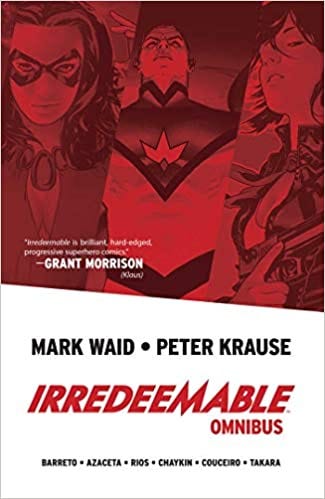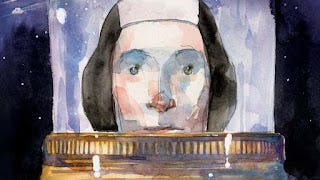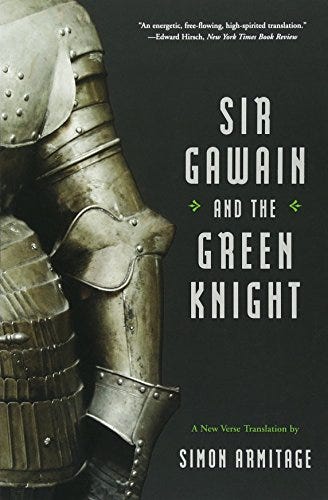.
060) Irredeemable by Mark Waid, et al., finished May 20
I can't remember what I was actually looking for on the library website when this popped up, but Mark Waid's a respectable name so I placed it on hold. When I picked it up and it was 896 pages I about threw it back. Would have, had I been walking home. But I set it next to my bed rather assuming I would never pick it up. 896 pages is a big commitment for a book I long to read. And I had no memory of this one.
Besides, I'm a bit burned out on the-most-powerful-superhero-is-the-badguy stories. Two seasons of The Boys has been plenty and I never quite made it through even season one of Invincible. Both are great, but enough already!
Incidentally, all three comics were coming out at around the same time. So that was the zeitgeist, I guess.
I read quite a bit of Invincible once upon a time but not The Boys. And now on to Irredeemable.
It's good. Let's start there. It starts after the goodguy has already gone full badguy so no time wasted on buildup. Among the other heroes, Qubit is among the most interesting characters in this genre I've ever read, and all the characters bring new ideas to superheroing. Nothing's really wasted here. Plus, the story just keeps growing in complexity. And when something comes off a bit deus ex machina, it ends up just being another complication.
Among the fine choices made is the relationship between our erstwhile Superman and his greatest nemesis, which takes the Batman/Joker vibe from LEGO Batman and explodes it. It becomes one of the strangest, most perverse, complex, and fascinating hero/villain (villain/villain) relationships I've read.
It even has a cute ending that is somehow both too much and just right? I think I would have liked it better, had it got the history correct.
Anyway, I have zero regrets reading it. I'm still surprised I did, but it was a fun, provocative, intelligent, original, and brutal, brutal ride.
There's a reason, I guess, we're still reading superhero comics.
five days
061) Stanslaw Lev's The Seventh Voyage by Jon J Muth, finished May 23
I saw this book at the library and it intrigued but, since most adaptations-int-comics aren't good and because I'm trying to cut back on library books, I didn't get it. Then, immediately afterwards, I read an article in The New Yorker that made me reconsider so I immediately put it on hold.
I don't think I've read any Lev. I've seen the Soderbergh Solaris but I was NOT prepared for it. So this, another adaptation, is arguably my introduction.
First, I can't speak of it as an "adaptation," but this is a very fun read. And Muth's pacing and art are terrific. The goofy introduction sets a marvelous tone and it's madness thereonout.
Basically, this astronaut's stuck in space because fixing his rudder takes two people. Luckily, he's able to tilt his navigation juuuust enough to throw him into a wonky portion of spacetime causing more versions of himself from other moments in time to appear and help him fix the ship.
However, they are not that helpful.
I'll also add that Muth's artist notes at the end are fascinating. He makes models before he paints!
two nights
062) Sir Gawain and the Green Knight translated by Simon Armitage, finished May 28
I bumped into this in high-school English and both loved it and feared it. Perhaps because my teacher told we'd all been saying it wrong.
Well, Mr Richards. According to this introduction, the text suggests both our pronunciations are correct.
And my memory of the story is largely from rewatching bits of Joseph Campbell with my own students over the years.
And I reckon this is my first time reading the whole thing.
This is a side-by-side version with the Middle English on the left and Armitage's vigorous and sometimes happily nuts translation on the right. I wanted to read the Middle English but, well, this is from northern England and it's a lot more mystifying that Chaucer. And let's not pretend Chaucer's a walk in the park. So while I would occasionally read lines and phrases in the original, I largely stuck with Armitage who successfully builds characters and suspence and simply brings the story's rollick into the present.
And like all good writing, it made me want to attempt something of the same. Lots of alliteration, lil quatrains at the end of each bit. Break it into fitts because what a word that is!
I'm flirting with the idea of rewriting "Duties of a Deacon" as a sort of mock epic in the style, then submitting it on the sly to Michael Collings.
I am engaged in other projects whose momentum I hate to interrupt and if he doesn't like it, what the heck else could I do with it?
But fun and art are their own reward.
short bursts over several weeks
063) Heike's Void by Stephen L. Peck, finished May 30
This is my fourth Peck novel (after A Short Stay in Hell; Scholar of Moab; and King Leere, Goatherd of the La Sals) and I think I can say it is my favorite. It checks all the Peck boxes: intellectually challenging, thematically complex, diversity of subject matter, horrific at parts, wise, redrock canyons, having knowable characters, having perhaps unknowable characters, collagic, occasional bursts of impossible vocabulary—you name it! Both the elements that make Peck's worth both compelling and inviting and repulsive are in full force here and the balance here is
He's dealing with elements I'm always wanting to see more of (eg: angels, the after life, redemption, violence, lgbtq Mormons) and doing so in complex and perplexing ways.
I'm not as widely read in Mormon lit as is generally supposed (or it might be better said that I'm widely read enough to grasp how large the field actually is) but I'm willing to say all the same that Steve has set the bar and the rest of us are still aspiring to leap.
In short
No, that's impossible.
In medium, Heike is a philosopher cum murderer. Her first victim survives and
No, I'll give too much away. And I've only mentioned one character so far!
Instead, let me just mention characters.
Elder Holberg, the apostle whom God hates.
Alma Lune, widower of the deeply homomisic Holberg's son (and the good elder's secretary)
Arrow Beaton, a pothead soldier who accidentally sells C-4 to the enemy.
Nephi, an ancient prophet on a crappy angelic
You know what? Even this is risky.
Suffice it to say that in this novel Peck is asking questions as weighty as any he has ever asked and although the ending is still unwilling to deliver us joy this novel remains open and happy and beautiful and optimistic on net.
I mean—this is a novel whose first forty-eight pages are essentially a shaggy-dog story to introduce the plot. And it's not upsetting! The novel is playing games with both us and the characters. The rules to these games are complicated and the teams keep shuffling but we are all playing together and the novel's tendency to a universalist theology makes us hopeful to be hopeful.
just over a month










